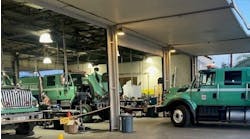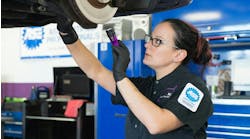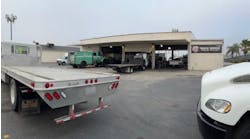ATAs' Spear gets 'aggressive' on election, emissions unions, and more in annual address
NASHVILLE, Tennessee—Chris Spear is ready for a new U.S. president. No matter who wins the election, you can expect to hear about how he or she is helping or hurting trucking. This week, Spear put his members, regulators, and politicians on notice that American Trucking Associations is “getting aggressive in our pitch and tone.”
Spear, who has headed the federation of trucking associations as president and chief executive for a decade, used his annual state of the industry address during the ATA management conference to detail how he is fighting for trucking’s future through “the most politically charged environments ever witnessed.”
He said the industry has to find a path forward through common sense instead of unachievable environmental and labor standards.
“Big union bosses are emboldened, thanks to a sitting president, vice president, and acting secretary of labor who decided this year it would be a great idea to walk a picket line,” he said in a fiery speech before trucking industry executives here in Music City.
Harris vs. Trump on trucking’s future
Spear said it’s essential to examine the differences between the two presidential candidates to see which would be better for motor carriers and the companies that supply them with equipment and technology.
While he threw no jabs at former President Donald Trump nor his proposed tariffs, which some say could hurt trucking’s growing cross-border transportation revenue, he was not shy about pointing out ATA policy differences with the Biden-Harris administration, accusing President Joe Biden of caring more about "union thugs" than trucking.
But Spear stressed that ATA would want a seat at the table for whoever wins the election.
“Mapping out the differences between another Biden, now Harris, administration and a second Trump term goes well beyond their policies and proposals,” Spear said. “We have to look deep within the departments and agencies, determining who will lead each initiative and if they will be a partner—or foe.”
Spear said ATA deserves credit for the $2.7 billion in goods moved daily by trucks across the U.S.-Mexico border. He did not address Trump’s growing tariff threats on imported goods, which the former president said should be as high as 200% on vehicles imported from Mexico.
Dean Croke, the longtime industry analyst with DAT Freight & Analytics, noted during an ACT Research seminar this summer that while Republicans traditionally are more friendly to the trucking industry, the tariff threats could lead to a trade war that would impact motor carriers.
“I think that would be very destructive to the freight market,” Croke said the same week the Democrats nominated Vice President Kamala Harris for president. “We saw a little bit of that between ‘18-’19… That disrupted the trade market and set us into that spiral in 2019. So I’m kind of sitting on the fence here, but I err on the side of I think if we kept the same administration, we’d be OK. If we had a new administration, I think that would be more destructive.”
The ATA president said his organization is committed to engaging with the next White House and reminding his members that the current occupant is not aligned with some of ATA's most significant concerns. “Our policies and solutions not only envelop common sense and data—they’re also achievable,” he noted. “Our contribution to the supply chain and economy make trucking the ideal partner of choice for government decision-makers.”
He asked the hundreds in the audience to commit to standing with ATA and sharing trucking’s story with America and how it drives the U.S. economy.
“We contribute to each and every meal,” he said. “We understand the choices people have at their local stores, the prices they pay, and why those costs keep going up. And we know what needs to happen in order to lay that table, pay those bills, afford those back-to-school clothes, shoes, and supplies—and, if there’s enough left over, take that much-needed vacation. We know the daily pressures faced by American families because we are those families. Our 8.5 million employees aren’t just moving goods; we’re supporting the lives of millions of hardworking Americans who depend on trucking each day to keep this country running smoothly.”
See also: Road to election: Where candidates stand on trucking issues
Why the U.S. needs more reasonable emissions regulations
Spear continues to call the Biden administration’s environment policies a “mad dash to zero” but noted that more federal and state legislators are noticing that cutting carbon isn’t as easy as their regulations make it out to be. And he reminded his members that trucking wants cleaner transportation—but at a better pace.
“We preface by highlighting what we’ve done, not only because it paints our industry in a positive light but because our achievements didn’t center on an all-or-nothing approach,” he said before laying out trucking’s 21st-century environmental resume:
- Supporting the 2006 phase-out of sulfur in diesel fuel.
- Supporting EPA’s Smart Way program.
- “We led EPA and NHTSA regulations in 2011 and 2016, cutting CO2 emissions by 1.4 billion tons and reducing oil consumption by 2.5 billion barrels by 2027.”
- It takes 60 of today’s clean-diesel trucks to match one 1988 truck’s emissions.
“But today’s EPA and California regulations are undermining these emissions cuts because they disregard other readily available technologies and solutions,” Spear said.
He cited a Clean Freight Coaltion-funded research by Roland Berger that said it would cost $1 trillion to electrify the entire industry by 2040. ATA and other trucking trade groups founded the CFC to combat unreasonable emissions regulations and focus on common sense solutions from a trucking perspective.
“A diversified industry like trucking requires multiple solutions to reduce emissions. This administration needs to wake up, stop picking favorites, and start focusing on the overall goal—reducing emissions,” Spear said. “Incentivize the replacement of aging trucks and engines by repealing the federal excise tax. Allow renewable fuels for diesel engines. Real solutions that further cut emissions, starting today.”
He noted that trucking can’t operate with EV range anxiety. “Let’s ease those fears by adopting a commonsense approach toward the environment, one that reduces emissions and doesn’t bankrupt an industry—now moving 72.5% of our nation’s freight, including everything American families need just to get by.”
See also: Comparing HD EV mandates and rules with reality
ATA on labor, strikes, lawsuits, and marijuana
Here are some other notable quotes by Spear during his wide-ranging, fiery speech about how he and ATA view these transformative, polarizing times:
- On organized labor: “Union membership continues to plummet across the country, but that hasn’t stopped this president, vice president, and acting secretary of labor from tucking this entire administration into the pockets of big union bosses. To be clear, ATA is not fundamentally opposed to labor unions. Workers have had the right to join and, just as importantly, not join a union for over nine decades. However, this administration has dismissed all non-union employers—over 90% of the country’s businesses—as subservient bottom feeders.”
- On the recent three-day port strike: “We all just witnessed firsthand why taking sides in a labor dispute undermines not just our economy, but those struggling to overcome a natural disaster. All because this president values union thuggery more than you. Allowing our East and Gulf Coast ports to shut down while thousands of Americans are reeling from the aftermath of Hurricane Helene defies all common sense.”
- On California’s independent contractor rule: “And then there’s Julie Su, who for nearly two years continues to serve as President Biden’s acting Secretary of Labor… ill-suited to serve based on her unwillingness to explain her role in California’s AB5 assault on independent contractors. When it comes to representing our members, ATA remains entirely committed to the 350,000 independent contractors that support our industry.”
- On nuclear verdicts: “We’ve seen some jaw-dropping decisions this year… ATA won’t stand for the plaintiff bar’s abuse of the civil litigation system. And our efforts are paying off. In 2024, 13 more states introduced lawsuit abuse reform bills, all following recent wins in Colorado, Georgia, Indiana, Louisiana, and West Virginia.”
- On predatory towing: “We listened to your concerns over growing price gouging schemes by predatory towing companies and responded with the same efforts we’ve used to tackle lawsuit abuse. Model legislation is now being introduced and passed in several states, including Mississippi, Florida, Tennessee, and Oklahoma. These victories have generated greater awareness in the Department of Transportation and Congress. And we’re just getting started.”
- On marijuana: “When the Biden-Harris Administration announced its plans to reclassify marijuana, ATA was quick to ask the Department of Transportation and Congress: ‘What does this mean for trucking?’ A question these so-called pro-safety advocates have yet to ask, tone deaf to the risks of someone impaired getting behind the wheel of an 80,000 lb. commercial vehicle. So, while they order up Papa John’s, we’ll keep pushing Congress and regulatory agencies to put the health and safety of the nation’s motoring public ahead of recreational drug users.”
- On successful policy lobbying efforts: “Despite a dysfunctional Congress and the backdrop of an increasingly bitter presidential race, the fiscal year 2025 appropriations bills are chock-full of ATA strategic priorities.” He listed out the potential provisions “teed up and waiting” for Congress post-election:
- $200 million more for dedicated truck parking;
- Provisions to combat cargo theft and predatory towing;
- Improving the safe driver apprenticeship program;
- Encouraging action on hair drug testing;
- Blocking the DOT from taking action on California’s meal and rest preemption;
- Preventing the DOL from implementing its independent contractor;
- Joint employer and walk-around rules;
- Blocking EPA from moving forward on its Greenhouse Gas 3 rule.
“Now let’s stick together, get loud, and kick ass in 2025,” Spear exclaimed as he ended his annual ATA MC&E state of the industry address.
This article was originally published on FleetOwner.com.



